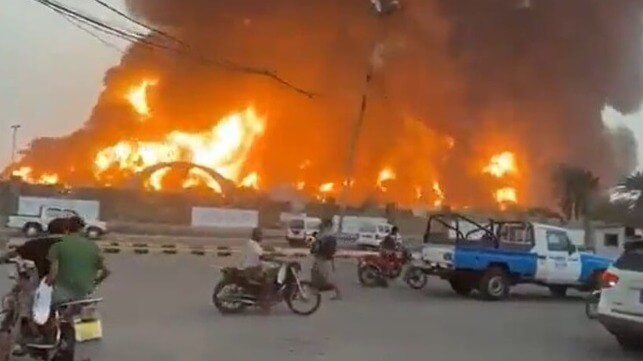Israeli Air Force Destroys Tank Farm at Port of Hodeidah

[Updated] On Saturday evening, the Israeli Air Force bombed the port of Hodeidah, Yemen in retaliation for the Houthi drone strike on Tel Aviv last week.
Israeli F-15 strike fighters made the 1,000-nautical-mile flight to northeastern Yemen at about 1800 hours Saturday. In several waves, they struck a fuel storage depot and a power station near the main seaport, just north of the city. A spokesperson for the Israeli military acknowledged that these were "dual use" targets, with civilian as well as military utility.
As of Sunday, at least six people were dead and another 83 wounded by the attack, according to Houthi sources.
Hutiji so dejali, da izraelski zra?ni napadi na mesto Hodejda v Jemnu ne bodo ostali "brez u?inkovitega odgovora sovražniku", TV kanal Al Masirah. pic.twitter.com/mRMQL10EwZ
— cebelica (@cebelica4) July 20, 2024
Satellite Imagery by Maxar of the Port of Al-Hudaydah in Western Yemen show much of it in Total Ruin after yesterday’s Strikes by the Israeli Air Force, with Dozens of Storage Tanks filled with Millions of Gallons of Fuel and Oil still in Flames. pic.twitter.com/aSemyTC6Il
— OSINTdefender (@sentdefender) July 21, 2024
Hodeidah's fuel terminal is adjacent to its dry bulk and container terminals, which handle the majority of food aid and other goods for the population of northern Yemen. Any damage to these facilities - whether from the initial attack, or from subsequent spreading fire - would impact food distribution. Fuel shortages from the destruction of the tank farm could also complicate the process of getting goods from the quayside to people in need.
"The Israeli response on destroying Hudaydah port will not have a significant impact on the Houthi ballistic weapons or drone capabilities. Rather it will actually worsen the already severe humanitarian crisis in Yemen," warned Farea Al-Muslimi, a Chatham House fellow, in an interview with Newsweek.
In a statement, the Israeli military noted that the port is also a hub for covert Iranian weapons shipments to the Houthis. Iran's drone and missile systems are essential for Houthi attacks on merchant shipping and on neighboring states, and many of these weapons shipments have been intercepted by U.S. and allied forces.
The Israeli military asserted that there was no involvement by UK or U.S. forces in the strike. The attack on the port was far larger and far more damaging to the Yemeni economy than any of the Anglo-British attacks of the last few months.
Hodeidah the only port city in Yemen under the control of Houthi administration is now burning. This port city was a vital lifeline for Houthis to exercise their military operations in the Red Sea and use it as smuggling route to bring in Iranian military drones & tech. pic.twitter.com/XOk3Layrzr
— OgadenSoldier ? (@OgadenSoldier) July 20, 2024
Houthi spokesman Yahya Saree said Saturday that the group "will respond to this blatant aggression" and will continue its attacks on Israel. He pledged that Houthi forces will continue their militant activities until Israel ends its operation against Hamas in Gaza.
The Israeli strike was in retaliation for a drone attack on the city of Tel Aviv on Friday, which killed one resident and injured 10. It was a rare instance of a hostile drone penetrating Israeli air defenses, and the Houthis immediately took credit, claiming that they had fielded a new drone model that was invisible to Israeli radar. The Israeli Defense Forces identified the drone as an upgraded Iranian Samad-3, a conventional UAV previously used by the Houthis to attack American shipping; the IDF said that the incoming aerial vehicle was spotted, but it was not identified as a threat because of human error.
"The first time that they harmed an Israeli citizen, we struck them. And we will do this in any place where it may be required," said Israeli defense minister Yoav Gallant on Saturday.

that matters most
Get the latest maritime news delivered to your inbox daily.
Houthi forces attempted to strike back Sunday with a ballistic missile attack on Eilat, Israel's southernmost seaport. The Israeli Defense Forces said in a statement that the threat was shot down.
"The projectile did not cross into Israeli territory. Rocket and missile sirens were sounded following the possibility of falling shrapnel," the IDF said in a statement.
